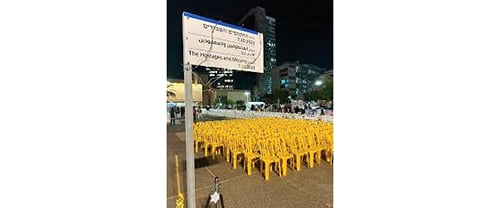
* Edited by Rabbi Neil Fleischman
Recently, the Jewish people celebrated Sukkot, a holiday where grown men use sleeping bags to sleep in oversized huts for seven days. Our rabbis call this holiday, zman simchatanu, the time of joy. Non-Jewish people know this as the holiday of tabernacles. Over this Sukkot, my family and I visited Israel. One Chol Hamoed family outing prompted me to learn one of life’s most important lessons.
On the second of Chol Hamoed, my family and I visited Hostage Square in Tel Aviv. This exhibit contains a 30-foot-long replica of a Gaza tunnel. Visitors can sit and walk inside of it to experience the persistent discomfort the hostages endure. Citizens displaced from their communities have also set up a booth where they sell “Bring Them Home” T-shirts. However, visitors to Hostage Square spend most of their time at its various tents.
Several large tents stand throughout the exhibit. Each one contains family members or friends of those taken hostage by Hamas on October 7, 2023. The hostage’s family member or friend sits atop a chair and speaks to listeners. In one tent, a tall man in his 60s spoke to a crowd of 60 about his abducted 23-year-old son. A young man once a part of Israel’s special forces unit. A young man with dreams to get married and raise a family. Listeners to the speech wanted one thing and one thing only: for this man to have his son back.
At the halfway point of his talk, he discussed God’s role in his son’s captivity. “I am not a religious man. However, the fact that my son was not killed on October 7, but was rather taken hostage, is something I must be thankful to Hashem for.” During the Gaza war of 2014, Yeshiva University’s beit midrash implemented saying Tehillim for people in Israel following davening. After six weeks of reciting Tehillim post-davening, no appreciable changes occurred in Israel. This stagnant outcome prompted a frustrated student to ask Rabbi Herschel Schachter a theological question.
“Rabbi, we say Tehillim every day for things in Israel to get better. Yet, things have just stayed the same. What’s the point of continuing to say all this Tehillim if things aren’t getting better?” Calm and collected, Rabbi Schechter offered a memorable reply: “The fact that things have stayed the same may be a blessing in it of itself from God. It could be so much worse.” Both this speaker and Rabbi Schachter have the immense emunah to pinpoint God’s kindness amidst heartbreaking times.
In his conclusion the father discussed his son’s current whereabouts. A few months ago, one freed hostage notified the government of his son’s death. She had become friends with his son while in Gaza and witnessed the boy’s body get tossed into a body bag. According to Jewish law, you only need one witness to indicate whether someone died or not.
Following news of the son’s passing, Prime Minister Netanyahu paid a visit to his father. In their meeting, this father reiterated one point to Netanyahu. “Do not risk any soldiers’ lives to bring my son’s body back. Do not let a soldier lose one hair to bring my son’s body back.” Following the speech, my father and I approached him. “I hope you have a great holiday,” said my father. He replied in Hebrew, “Chazak,” “be strong.” This man was not a rabbi. Nor did he wear a yarmulke, yet his words of chizuk prompted everyone to feel like it was Kol Nidre night.
At Hostage Square nobody thinks about fantasy football, big muscles or fancy watches. Rather, people think about how lucky they are to have a family, how lucky they are to be alive. People think about how the IDF soldiers give up their Yom Tov and Chol Hamoed in order for us to have a safe and meaningful chag. Cherish and appreciate family dinner or Shabbat family time. It’s a gift thousands of Israel families don’t have right now.
In the prayer for Rosh Chodesh, we recite, “Chaverim kol Yisrael: All Israel are friends.” It does not matter what shul, school or camp someone attends. Nor does it matter what candidate someone supports on their lawn or votes for. We are all family. And each hostage represents our brother or sister. Pray for our brothers and sisters to be returned from Hamas.











